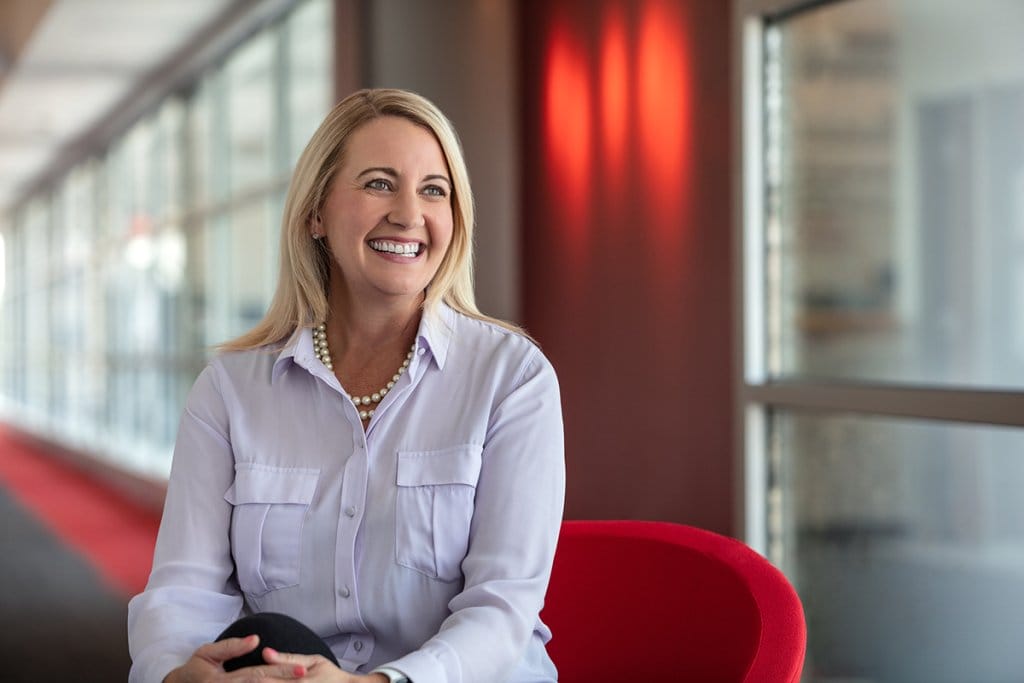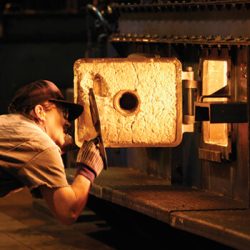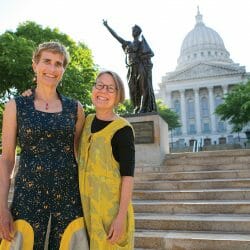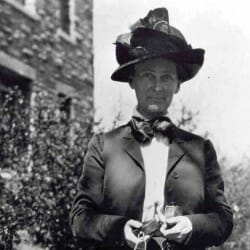Campus Is in her Genes
As she rises to the role of WFAA’s CEO, Alisa Robertson ’94, MBA’03’s career comes full circle.

Robertson: “The world around us is changing quickly, and if we stand still, we’re going to fall behind.” C&N Photography
From Alisa Robertson ’94, MBA’03’s early days enjoying Babcock ice cream on campus with her parents, UW–Madison has been a part of her identity.
Robertson is a Madison native, and her mother was a longtime UW employee — she spent a lot of time around campus with her family as a child. After earning her bachelor’s degree, Robertson worked at Wood Communications, a public affairs firm, before returning to the university as assistant editor of Update, the alumni magazine for the Wisconsin School of Business. She earned her MBA while working at the business school. After progressing to associate dean for advancement, she transitioned to the UW Foundation, now the Wisconsin Foundation and Alumni Association (WFAA).
“I have a lot of emotional ties to the university,” Robertson says. “I have learned and grown so much here — as a student and also throughout my career.”
Robertson brings that special connection to campus to her new role as president and CEO of WFAA. She follows Mike Knetter, who has led WFAA since 2011, and on January 1, she will become the fifth leader in the organization’s 80-year history.
You’ve been on campus a long time — you must have found some hidden treasures.
Like many Badgers, I have memories of classes in the Humanities Building. As a student, I worked in a clerical role for Stanley Kutler, the renowned history professor who won the legal case to release the Watergate tapes. I also have fond memories of the Helen C. White building, where I took many classes as an undergraduate English major. I had the opportunity to get to know several faculty members, including Professors Susanne Wofford and Stan Henning, who were both outstanding mentors. That’s what is so special about the UW — the faculty are doing incredible work, and they remain so relatable and available to their students.
When did you start to get interested in alumni alumni and donor relations?
While I was a student, Grainger Hall was built. During my senior year, I had one class in the Nicholas lecture hall there. The space was absolutely beautiful and technologically advanced compared to other spaces on campus. I had some knowledge that Grainger Hall was built with donor support, but I didn’t truly appreciate the value of that support at the time.
Four years later, when I joined the business school, the building was still new, and I had many opportunities to give tours to alumni and donors. I remember the tour script had a story about John and Tashia Morgridge’s support of the Grainger Hall project, which at the time was critical to the school’s ability to expand enrollment. A few years later, I had the opportunity to meet John and Tashia Morgridge, Ab and Nancy Nicholas, and many other donors who supported the university. Their generosity has become such a huge part of so many transformational improvements on campus — scholarships, professorships, buildings, and more. It’s shown me the full circle of the student-alum-donor experience: seeing this building being built, hearing this story about these donors who made it happen, and then getting to know them years later. The Badger community really is special.
What have you learned during these years on campus?
The world around us is changing quickly, and if we stand still, we’re going to fall behind. In our work, we must keep innovating and skating to where the puck is going. Our organization changed significantly under Mike Knetter’s leadership. He and Paula Bonner demonstrated outstanding leadership when they merged the foundation and the alumni association 10 years ago, understanding that it was in the best interest of the university. Working in partnership with faculty, staff, and leaders at UW–Madison has taught me that we need to be curious, be open to new opportunities, and learn from our mistakes. I’m proud that our team at WFAA embraces that approach, and I’m excited about the opportunities to continue innovating and driving results that benefit our university.
You describe WFAA as an advancement organization. How do you define advancement?
Broadly, the term advancement means engaging key stakeholders to move the university forward. More specifically, it means building pride, affinity, and community with stakeholders and securing resources to support the university. Now more than ever, philanthropic support, volunteer support, strategic advice from alumni and friends — those are the things that will differentiate the universities that advance and increase their impact on the world from those that do not.
What do you see as the biggest challenges that the UW faces?
Political polarization and a decline in trust and confidence in higher education are major challenges facing the UW and other universities around the country. At WFAA we strive to engage a broad set of alumni and friends of the university who have different viewpoints. We find that exposing stakeholders to the actual work that is being done at the UW — both research and education — can help build trust and confidence. We will also continue to partner with the UW to raise funds for important programs that alleviate costs for families, help students be more career-ready, and support research that will improve lives here in Wisconsin and out in the world.
Where do you see UW–Madison’s biggest opportunities?
Chancellor Mnookin has articulated some of the UW’s greatest opportunities on the horizon with the RISE [Research, Innovation, and Scholarly Excellence] initiatives — I am excited about the many ways that the UW can help address important societal issues and opportunities related to artificial intelligence, sustainability, and helping people thrive as they age. University leaders are also committed to providing access to an affordable world-class education to as many students as possible. Incredible scholarship support provided by many donors around the world helps make this possible.
What are WFAA’s opportunities?
A lot of our work is focused on building trusting relationships with individuals. That won’t change. The UW has an incredibly large alumni base — as well as many other stakeholders, including parents, friends, and grateful patients and clients — spread out all over the world. Advances in technology can help us scale our operations to involve even more people in the great work that’s happening at the UW. And we want to continue our focus on providing excellent stewardship. We are committed to honoring the intentions of our donors and sharing the impact of philanthropic support. I’m grateful for Mike’s leadership and for our board’s leadership, which have put WFAA in such a strong position to deliver on these commitments. I am honored and excited to continue working on behalf of my alma mater as president and CEO of WFAA.
80
Number of years the UW Foundation (now WFAA) has existed
5
Number of leaders since WFAA’s founding in 1945, once Alisa Robertson takes the reins
$4.2B
Number of dollars raised to support the university in WFAA’s most recent campaign, All Ways Forward
Published in the Winter 2024 issue



Comments
Richard Schafer December 24, 2024
Congratulations Alisa,
I can feel how proud you are as part of the University and be tne new CEO of WFAA. I also feel that pride as an Alumni and former staff. Best to You
Stephen Whitehouse July 8, 2025
Congratulations, I’ve been a supporter and have been impressed with the University and what it has to offer. I hope the best for its future growth and will continue to be of support.